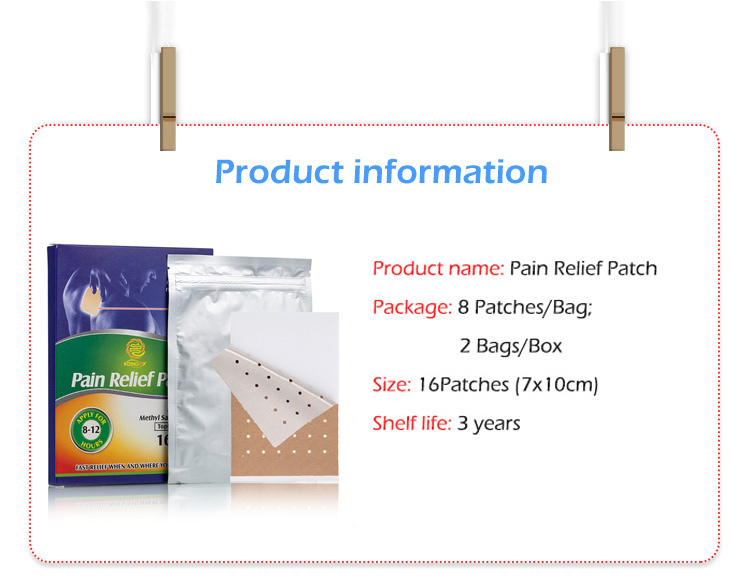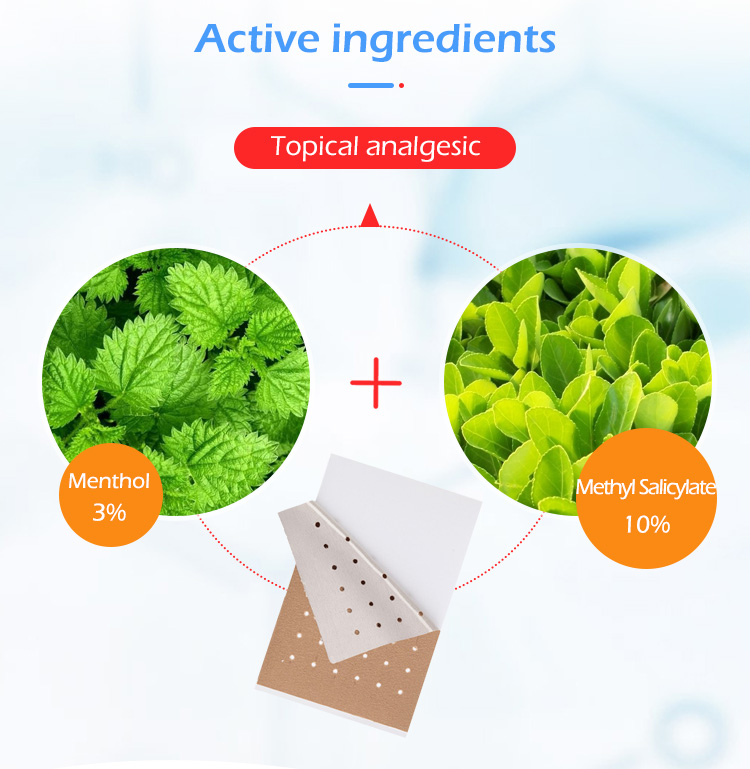How Do I Choose the Right Herbal Pain Patches Supplier for My Brand?
Choosing the right Herbal Pain Patches Supplier is a crucial step in building a successful pain relief product line for your brand. With the growing demand for natural and effective solutions, herbal pain patches have become a popular choice for customers seeking relief from chronic pain, muscle aches, and joint discomfort. However, the quality of your herbal pain patches is directly influenced by the supplier you choose. Therefore, selecting a reliable Herbal Pain Patches Manufacturer or Herbal Pain Patches OEM partner is key to ensuring that your products meet the highest standards of quality, effectiveness, and safety.
In this article, we will guide you through the essential factors to consider when choosing the right Herbal Pain Patches Supplier for your brand. By understanding the nuances of product quality, customization options, and supplier reliability, you can make an informed decision that will set your brand up for long-term success in the competitive market of Custom Herbal Pain Patches.

1. Evaluate Product Quality and Effectiveness
The quality of the herbal pain patches you sell is the most important factor for establishing your brand’s reputation. When choosing a Herbal Pain Patches Manufacturer, you must ensure that the products meet both industry standards and your own quality expectations.
Key Factors to Consider:
Ingredients and Formulation: The quality of the herbal ingredients used in the pain patches is vital. Look for a supplier that uses proven, high-quality herbs known for their pain-relieving properties, such as menthol, camphor, or arnica. Additionally, ask for details about the sourcing and processing of these ingredients.
Manufacturing Standards: A reputable Herbal Pain Patches Supplier should adhere to strict manufacturing standards, such as Good Manufacturing Practices (GMP). GMP ensures that the products are produced in a controlled, clean environment and are subject to rigorous testing for consistency and safety.
Clinical Testing and Efficacy: Ask if the supplier conducts clinical testing on their products to demonstrate efficacy and safety. Clinical validation ensures that the patches perform as expected, offering real pain relief to customers.
Why It Matters:
By partnering with a high-quality Herbal Pain Patches OEM, you can guarantee that your products will meet customer expectations, build trust, and foster brand loyalty.
2. Assess Customization and Flexibility Options
One of the key benefits of working with a Herbal Pain Patches Manufacturer or OEM Supplier is the ability to customize your product to meet the specific needs of your brand and target audience. A good supplier should be flexible and offer options for customization.
Key Customization Features to Look for:
Custom Formulations: If you want to create a unique product with distinct pain-relief benefits, find a supplier that offers Custom Herbal Pain Patches. This could include the ability to mix and match herbal ingredients, adjust the strength of the patches, or create special formulas targeting specific types of pain (e.g., muscle soreness vs. joint pain).
Private Labeling Options: If you’re looking to rebrand existing products, look for suppliers who offer Private Label Herbal Pain Patches. This allows you to sell pre-made patches under your own brand name. Make sure the supplier can handle your packaging requirements, including logos, design, and any other branding elements you want to include.
Packaging Customization: Beyond the patch itself, customization often extends to packaging. A good Herbal Pain Patches Supplier should offer packaging solutions that align with your brand identity. Whether you need eco-friendly materials, child-resistant packaging, or unique design elements, the supplier should accommodate your needs.
Why It Matters:
Customization is key to differentiating your brand from competitors. Whether you're creating a completely new formula or putting your unique spin on an existing product, working with a supplier that offers flexibility in product design can set your brand apart.
3. Supplier Reputation and Reliability
The reputation and reliability of your Herbal Pain Patches Supplier are essential for ensuring smooth operations and consistent product quality. You need a supplier who can meet your business’s demands for both product quality and delivery timelines.
Things to Look for:
Industry Reputation: Research the supplier’s reputation in the industry. Look for reviews, testimonials, and case studies from other businesses. If they have experience working with established brands, it’s a good sign that they are reliable and trustworthy.
Experience and Expertise: Suppliers with years of experience in producing Herbal Pain Patches or other similar products are more likely to understand the nuances of manufacturing, compliance, and quality assurance. Experience can also contribute to smoother problem resolution if issues arise.
Reliability and Lead Times: Timely delivery is crucial to maintaining your product availability and customer satisfaction. Discuss lead times and ensure that the supplier can consistently meet your deadlines. Delayed shipments or production issues can cause serious problems for your business.
Why It Matters:
A reliable supplier ensures that your Custom Herbal Pain Patches are delivered on time, in the right quantities, and to the quality standards you've agreed upon. This reliability is critical for maintaining customer satisfaction and keeping your business running smoothly.
4. Compliance with Regulatory Standards
Herbal pain patches are considered medical devices or therapeutic products, and as such, they must comply with specific regulatory standards in different markets. Choosing a supplier who understands these regulations is essential for ensuring that your products meet legal requirements.
Regulatory Considerations:
FDA Compliance: In the United States, Herbal Pain Patches OEM suppliers should follow FDA regulations, especially if the patches are marketed as medical devices. Ensure that the supplier can provide documentation proving that their products meet FDA guidelines.
CE Marking for Europe: If you plan to sell your herbal pain patches in Europe, make sure the supplier complies with EU regulations and can provide a CE mark to prove product safety and efficacy.
Other Certifications: Depending on your target markets, you may need certifications for organic or cruelty-free ingredients, eco-friendly packaging, or other sustainability initiatives.
Why It Matters:
Compliance with regulatory standards not only ensures that your products are safe and legal to sell but also builds customer trust. Products that meet regulatory requirements are more likely to be accepted by retailers and consumers alike.
5. Cost and Scalability
Cost is always a factor when selecting a supplier. However, it's important to balance cost with quality and reliability. Look for a Herbal Pain Patches Manufacturer or OEM Supplier that offers competitive pricing without compromising on the quality of the product.
Things to Consider:
Pricing Structure: Understand the supplier’s pricing structure, including any minimum order quantities (MOQs), discounts for bulk orders, and any hidden costs such as shipping or handling fees.
Scalability: Choose a supplier that can scale with your business as it grows. If your brand experiences a surge in demand, the supplier should be able to handle increased production volumes without compromising quality or delivery timelines.
Why It Matters:
Choosing a supplier that offers both competitive pricing and scalability ensures that your business can grow without encountering supply chain bottlenecks or unexpected costs.
6. Communication and Customer Service
Clear communication and strong customer service are essential when working with a Herbal Pain Patches Supplier. You need a supplier who is responsive, proactive, and willing to collaborate closely with you.
Things to Look for:
Transparency: The supplier should be open about their manufacturing processes, lead times, and any challenges they face. Transparency ensures that you are always in the loop about the status of your orders.
Support: A supplier with a strong customer support team can help resolve issues quickly, whether it’s regarding product quality, shipping delays, or any other concerns that may arise.
Why It Matters:
Good communication and customer service help prevent misunderstandings, ensure smooth order fulfillment, and foster a long-term, positive relationship with your supplier.
7. Frequently Asked Questions (FAQs)
1. What should I look for when evaluating an herbal pain patches supplier?
Look for a supplier with a strong reputation, high-quality products, flexible customization options, and reliable delivery times. It’s also important that they comply with regulatory standards for safety and efficacy.
2. How do I know if a herbal pain patches supplier meets regulatory standards?
Ask the supplier for documentation proving compliance with relevant regulations such as FDA guidelines (for the U.S.) or CE marking (for Europe). Reputable suppliers should have these certifications readily available.
3. What are the benefits of customizing herbal pain patches for my brand?
Customization allows you to differentiate your product in the market, tailor formulations to specific customer needs, and build a unique brand identity that stands out from competitors.
4. How can I ensure that the herbal pain patches I sell are safe and effective?
Work with a supplier who conducts clinical testing, uses high-quality herbal ingredients, and follows GMP standards to ensure that the product is both safe and effective for your customers.
5. What is the typical lead time for herbal pain patches?
Lead times vary by supplier, but typically, they range from a few weeks to several months, depending on whether you are ordering Custom Herbal Pain Patches or private label products.
Conclusion
Choosing the right Herbal Pain Patches Supplier is a critical decision that can impact the success of your brand. By considering factors like product quality, customization options, supplier reputation, regulatory compliance, and cost, you can ensure that your herbal pain patches meet the needs of your customers and help your business thrive in a competitive market. Whether you opt for Herbal Pain Patches OEM manufacturing or Private Label Herbal Pain Patches, a reliable supplier can support your brand’s growth while delivering high-quality products that enhance your customers’ well-being.






